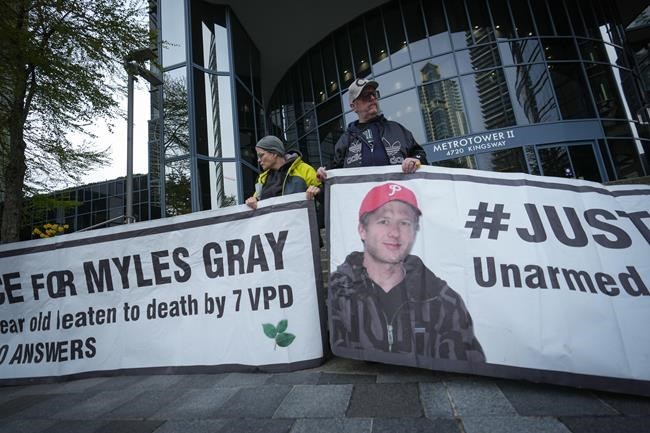BURNABY, B.C. — The jury in the British Columbia coroner's inquest into the death of Myles Gray after a beating by Vancouver police nearly eight years ago is recommending the department expedite its use of body-worn cameras for all patrol officers.
The five-member jury made just three recommendations in its verdict on Monday, but the suggestion for body cameras equipped with audio-recording capabilities was at the top of their list.
Gray, who was 33, died in August 2015 after the beating that left him with injuries including ruptured testicles and fractures in his eye socket, nose, voice box and rib.
One paramedic told the inquest he arrived at the scene and saw bruising so severe, he initially thought Gray was not a white man.
The jury found Gray died by homicide, a death due to injury intentionally inflicted by another person, although coroner Larry Marzinzik advised the jury before it began its deliberations that it was a neutral term that doesn't imply fault or blame.
The jury forewoman said the verdict was not unanimous, with four of the five members agreeing.
Ian Donaldson, a lawyer for Gray's family, told the media the homicide finding is significant because the police position had always been that Gray died of natural causes.
Several officers told the inquest they believed Gray had been experiencing "excited delirium," characterizing it as a life-threatening medical emergency.
"From my perspective, the jury's verdict puts an end to that. We know what the cause of death was," Donaldson said at the conclusion of the inquest. "We heard it from the forensic pathologist and the jury endorsed and accepted that."
Dr. Matthew Orde, the pathologist who performed the autopsy on Gray's body, testified last week that on occasion, it had been thought "so-called excited delirium syndrome" could result independently in death, but analysis of the published data suggests that's "quite unlikely."
He said "acute behavioural disturbance" is a better description for what Gray was experiencing on the day he died.
Gray's extreme physical exertion while police struggled to restrain him was also among the "perfect storm" of factors that led to his death, Orde said.
He told the inquest Gray died of a cardiac arrest complicated by police actions, pointing specifically to "neck compression," blunt force injuries, the use of pepper spray, forcing Gray onto his stomach and handcuffing him behind his back.
"In the context of someone who's extremely fatigued, (whose) body is fully ramped up ... I think these issues would be enough to tip him over the edge," Orde said.
The inquest opened with testimony from Melissa Gray, who described her brother as goofy, kind and loyal.
She said Gray had been diagnosed with bipolar disorder around 1999, but he'd been stable ever since. He operated a business on the Sunshine Coast.
The initial 911 call was about an agitated man who had sprayed a woman with a garden hose.
The jury's second recommendation for Vancouver police is to review and enhance the crisis de-escalation and containment training officers receive.
In particular, the jury suggested adding more frequent in-person and online training focused on how to make ongoing health and safety assessments and reduce risk to someone experiencing a mental health disturbance.
Several officers testified that Gray was behaving in an "animalistic" way, and he appeared not to feel pain as they hit him with their batons and knees, punched him in the face and wrestled him to the ground.
The Vancouver Police Department said in a statement it appreciates the work done by the coroner's jury and everyone who participated in the inquest.
"We will take some time to review the recommendations before speaking further."
Before the jury returned with its verdict on Monday, the inquest heard from Shelley Horne, the Vancouver police superintendent overseeing personnel services, who said she expects there will be a pilot project by this fall to equip 80 to 100 front-line officers with body cameras for up to nine months before the results are evaluated.
The third recommendation was aimed at the Provincial Health Services Authority, suggesting the CEO review its policies on keeping toxicology samples from people whose deaths are under investigation. The inquest heard Gray's samples were destroyed six months after his death, but they could have been used to provide greater detail about any substances that may have been in his blood.
While an initial drug screening report suggested Gray had a plant-based psychoactive compound in his system when he died, a forensic toxicologist told the inquest that followup testing revealed a concentration that didn't meet the threshold for detection. If the drug was present in Gray's blood, it was not at a level that would be considered toxic or lethal, toxicologist Aaron Shapiro testified.
A years-long investigation by B.C.'s police watchdog found reasonable grounds to believe an offence may have been committed and it submitted a report to the BC Prosecution Service for consideration of charges.
The service announced in late 2020 that it would not pursue charges against the officers involved in the struggle to arrest Gray, saying police were the only witnesses and the Crown couldn't prove any offence had been committed.
However, Donaldson said the evidence presented at the inquest is different than what the pathologist had to work with in 2015, and the information the prosecution service had in 2020.
"I think there’s a good argument that it should be looked at again," he said.
This report by The Canadian Press was first published May 1, 2023.
Brenna Owen, The Canadian Press



